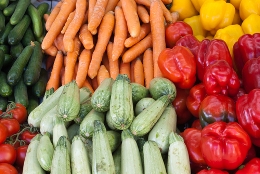18 November 2016
 With spring in full swing the launch of the Edible Gardens project, an Adelaide Citizen Science initiative by UniSA researchers, is set to engage food gardeners from across South Australia.
With spring in full swing the launch of the Edible Gardens project, an Adelaide Citizen Science initiative by UniSA researchers, is set to engage food gardeners from across South Australia.
The project aims to discover more about Adelaide’s urban food gardens, both their social value and their productive capabilities. Food gardeners are being invited to participate in the initiative, which is open to home gardens, community and school gardens.
Dr James Ward, of the School of Natural and Built Environments, says the project will develop greater understanding about urban food gardens (also known as urban agriculture), which are continuing to grow in popularity.
"Although urban food gardens are common, there is currently a serious lack of information on what it takes to grow food in urban environments,” Dr Ward says.
"Water in particular is a completely overlooked input, and yet is a scarce and expensive resource in South Australia. The data collected for this project will form the basis for a more realistic understanding of urban agriculture”.
PhD researcher Georgia Pollard, who is running the project, says participation will help people assess how productive their gardens actually are.
“Many people want to know exactly what they are putting into their food gardens and exactly how much food they’re actually growing,” Pollard says.
“There are so many different ways you can grow food, but which method fits the value that you’re after from your garden? Do you want to try to save money? Or to use less water? This project will help people figure that out, and learn all about their gardens while they do so.”
To participate, urban food gardeners can visit the Discovery Circle website and complete the Edible Gardens online survey. The short survey takes around 15 minutes and asks about gardening experience, what growing methods are currently used, and what growing food means to participants.
A final question will ask if participants would like to take part in collecting data on their own food garden, and, if selected, they will be provided with the tools (a water meter and a set of scales) to help gather that information, which will include weighing the food that is harvested.
Participants can enter their data into a completely customised web interface, built to collect the data and then display it instantly as colourful and interactive charts, allowing people to compare the results of their own separate garden areas, (e.g. compare the water use of their vegetable patch, with the water use of their chicken coop). They will be able to compare their whole garden’s results with the results of every single other participating garden.
Dr Philip Roetman, of UniSA’s Discovery Circle, says it is the commitment of participants that makes initiatives such as the Edible Gardens project, a success.
“Without the enthusiasm and engagement of citizen scientists, projects like this one could never succeed,” Dr Roetman says.
“Scientists can’t visit every urban food garden to regularly measure what is going in and what is being harvested. But dedicated urban gardeners can contribute large amounts of valuable data.”
Contact: Philip Roetman office +61 883021081 email Philip.Roetman@unisa.edu.au
Media contact: Will Venn office +61 883020096 mob 0401 366054 email will.venn@unisa.edu.au




